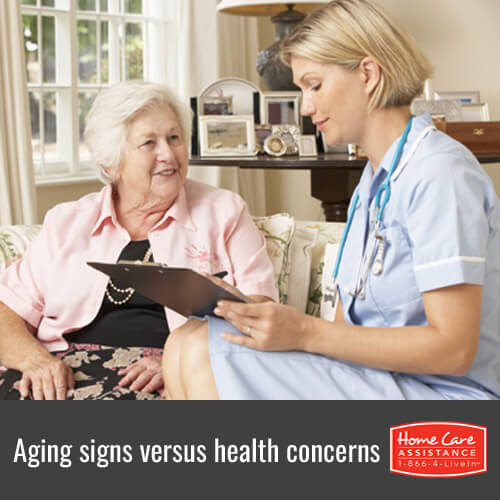It’s normal to expect a decrease in certain abilities as we age. However, there is a distinct difference between changes resulting from natural aging and those related to more serious health concerns. Take a look at these comparisons to help ensure your elderly loved one’s health and safety.
Poor Eyesight
The gradual loss of visual acuity is to be expected as we age. Cataracts, the most common cause of vision loss in people over 40, are the clouding of the eye’s natural lens. However, peripheral vision that is worse than central vision, or vice-versa, is cause for concern because it may be a sign of glaucoma, which can result in blindness.
Hearing Impairment
One-third of people over the age of 60 experience some form of hearing loss, which may be due to the loss of sensory receptors in the inner ear. However, pain, drainage from the ear, or rapid loss of hearing may indicate a tumor or infection. Also, consider getting your loved one checked if hearing in one ear is significantly less than the other.
Memory Loss
Forgetting where something was placed or the name of someone who you have not seen in a while is common, as is a reduced ability to recall recent memories. Conversely, your loved one should seek help if forgetfulness begins to impair his or her daily life. Problems with episodic memory such as past personal experiences that occurred at a particular time or place may be a sign of Alzheimer’s disease. The inability to learn and retain new information also points to Alzheimer’s-related dementia and may indicate the need for Alzheimer’s or dementia care in Anchorage.
Reduced Strength and Stamina
As we age, we lose muscle tissue, which causes the muscles to become more rigid. This also applies to the heart. It is normal for the wall to become thicker and arteries to stiffen, and the heart rate also slows with age. Notify your loved one’s doctor immediately if he or she begins to experience pain in the chest. Chest pain, especially when associated with dizziness, nausea, shortness of breath, and fainting, may be a sign of a heart attack.
It’s important to make sure your loved one sees a doctor regularly to help reduce his or her risk of developing dangerous health conditions. For those times you’re not available to take care of your loved one, having a professional caregiver in the home can also help keep your loved one safe and healthy. At Home Care Assistance, our caregivers are expertly trained to assist seniors with a variety of daily tasks, including exercise, medication reminders, and transportation to medical appointments. For more information on senior home care Anchorage families trust, call one of our experienced Care Managers at (907) 770-0907 to schedule a no-obligation consultation.
